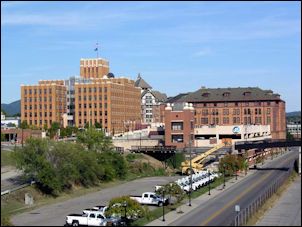by James A. Bacon
In the early 1880s, Gilded Era industrialists created a railroad junction at the town of Big Lick in the Roanoke Valley, opening up the western Virginia coalfields to development. The community renamed itself Roanoke after the river running through it, and the newly formed Norfolk & Western Railway set up its headquarters there. In the late 19th century, Roanoke was a boom town: a hub of railroad traffic and manufacturing and a gateway to the burgeoning Central Appalachia coal industry.
Eventually, the boom subsided, but Roanoke continued to fare well. Besides hosting a number of corporate headquarters, the Star City of the South, so named for the giant star on Mill Mountain, served as the retail and administrative center for much of western Virginia. When I lived there in the early 1980s — covering the coal and railroad beat for the Roanoke Times — Roanoke was a delightful community surrounded by natural beauty. I enjoyed living there and was sad to leave.
But my personal journey mirrored the intractable economics that Roanoke, and other cities its size, is struggling against. As a young reporter, I didn’t see much of a career path upward. To get ahead, I had to move. Ambitious young professionals in other fields faced the same dilemma. No matter how much they liked living there, many had to relocate to rise in the world. As the United States evolved into a Knowledge Economy, large metropolitan regions enjoyed tremendous advantages over Roanoke-sized cities by virtue of larger labor markets.
Roanoke has stagnated since I lived there. The writing on the wall appeared as early as 1982 when the Norfolk & Western Railway merged with the Southern Railway and located the new corporate headquarters in Norfolk. The top jobs left the city but, as part of the deal, the combined Norfolk Southern Railway did keep a major administrative presence in Roanoke. Now, three decades later, comes news that 500 employees working in marketing, accounting, information technology and other departments — desirable white-collar jobs — will be moved to Norfolk and Atlanta.
The company said it is closing the Roanoke office building to achieve departmental synergies, to make better use of its real estate assets and to support its goal of streamlining its management workforce. According to the Roanoke Times, Norfolk Southern President James A. Squires described the action as a consolidation having nothing to do with work force or business issues peculiar to Roanoke. The Roanoke office was less utilized than the offices in Norfolk and Atlanta, he said.
But that’s disingenuous. Of course the move had everything to do with Roanoke — or, more precisely, the size of its labor market. If Norfolk Southern had excess space in Norfolk, Atlanta and Roanoke, in theory, it could have shut down a Norfolk or Atlanta office and consolidated employees to the other two. Office space in Roanoke, I’m willing to wager, has the added advantage of costing less. But, the fact is, Norfolk and Atlanta are much larger labor markets, making it significantly easier for the railroad to recruit employees with white-collar skills.
The migration of corporate operations and white collar employees in the United States goes one way — from smaller cities and towns to bigger ones. The process does not work in reverse.
Looking back, Roanoke had one shot at bucking the trend — hitching up with the scientific and engineering brainpower at Virginia Tech. In theory, Blacksburg and Roanoke could have supported one another, with Virginia Tech spinning off high-tech start-ups and Roanoke providing financial, legal and other professional services. Despite the efforts of the Roanoke-Blacksburg Technology Council to bridge the 42-mile gap, the hoped-for synergies never really materialized. The Roanoke and New River valleys are divided by rugged mountains and connected by a single thread, Interstate 81. The 45-minute travel time created a psychological divide that has been hard to overcome.
It’s tremendously sad. The people of Roanoke are good people. In my personal experience, they are friendly, community-minded and egalitarian in spirit. It doesn’t seem fair that their economic prospects are leaking away because of forces beyond their control. But the world isn’t fair.
Update: I have to modify my categorical statement that the migration of corporate operations from small cities to big cities is a one-way flow. The very day I published this post, Edelman Technology, a German manufacturer of industrial equipment, announced its intention to locate its North American headquarters in Rocky Mount, roughly 30 miles south of Roanoke. The company will hire five to 10 employees including software specialists, electricians and industrial equipment maintenance staff. So, there are exceptions to the rule. They are few and they are minor, but there are exceptions.



